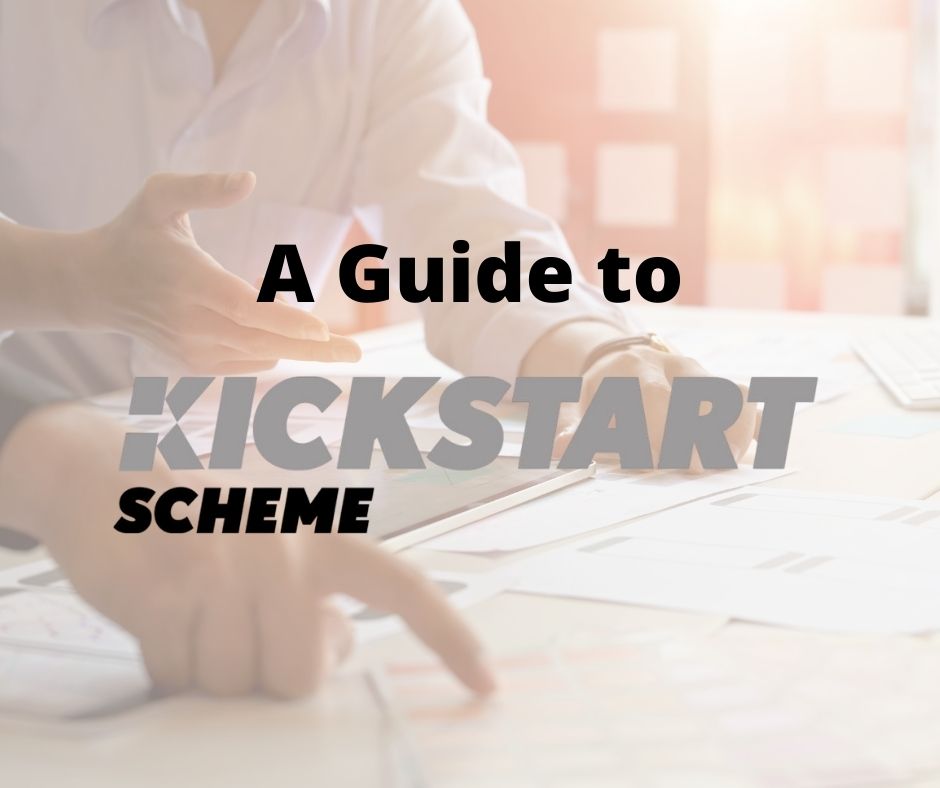Thinking of applying to Kickstart? This article tells you exactly what you need to know.
While Kickstart is aimed primarily at helping those out of work, perhaps surprisingly it also provides an excellent business support scheme for small business owners. Read on to find out how.
Background to Kickstart
The Government has made provision of £2bn as part of the funding for Covid Recovery to fund work placements for Universal Credit Claimants between the ages of 16 and 25.
Kickstart funding will pay for up to 25 hours a week at the appropriate minimum wage (£8.20 for 21-24yo and £6.45 for 18-20yo) plus prevailing employer National Insurance over a period of 6 months. In addition, the Kickstart scheme pays £1500 for every placement to cover the set-up costs including provision of employability training to the new employee.

There are a few conditions:
- This must be a new post and cannot be a replacement for somebody made redundant
- The employee must be on PAYE
- Provision must be paid for employability training.
- No more than 2 weeks of the time can be spent on pre-joining training
After 6 months, the employee is either retained and funded by the employer, or they can be replaced with another Kickstart employee.
Making Kickstart work for small businesses
Despite the way the Government has introduced Kickstart, making it particularly unfriendly for small businesses: applications only being accepted in batches of 30 or more placements – far more than the vast majority of SMEs could take on, there are ways to overcome this major hurdle.
Employers can either band together to make up the 30 between them or find a representative to aggregate applications on their behalf. Most prefer the latter because the organisation submitting the application becomes the intermediary and is tasked with managing all of the dealings with the Department for Work and Pensions on behalf of the group of employers.
Kickstart also requires that employees are paid through payroll, which is complex and expensive for small businesses (see later for a solution to this too). Reimbursement of payroll costs happens only every other month in arrears, so employers will either need to manage that cashflow or pay their Kickstart employee every other month. This latter option is not as bad as it seems as employees will still be receiving Universal Credit until they declare receipt of earnings so this is not the same as asking employees to fund the employers cashflow.
Reimagining Kickstart as Growth support for small businesses
Although the Kickstart scheme is aimed at those out of work, it also provides an excellent support scheme for small businesses. Working with over 4000 small business owners over the last 8 years, it has become clear how many ambitious businesses get overwhelmed with work which seriously impacts their ability to grow.
There are only so many hours in a day even if small business owners use more than the standard 40. Besides which, being the boss and principal resource is pretty lonely; having somebody around to bounce ideas off can be incredibly helpful. And, of course, young people are typically more tech savvy, accelerating the potential to embrace the adoption of productivity enhancing tools and digital marketing.
Becoming an integral part of a small team, not only gives the employee more rounded experience, it also is likely to provide a far more fulfilling role – one that can be moulded around their particular talents and strengths enhancing the contribution they can make to the business.
For many, though, the idea of taking on a new employee is quite scary. How long will it take before new employees pay their way? Can we afford it? What work should I give them to do? Will they be able to do it to my standards? With no obvious answers to these questions, the idea of employing somebody new gets relegated to the “I’ll deal with that later” pile, which, as we know, often means it never happens.
But there are answers to all of these questions. In small business support Growth Accelerator programmes that we have run, addressing these fears is a high priority for participants. We provide training and coaching on key skills to prospective employers including:

- Valuing their time to concentrate on higher value adding activities
- How to delegate
- How to identify skills needed to recruit, write adverts and select applicants
- Increasing motivation and productivity through mutual goal setting
- Setting objectives to demonstrate how employees are adding value.
On our most recent programme over 40% of participants took on a virtual assistant as a low risk way of gaining some additional resource to allow owners to concentrate on higher value adding work. So why not use the Kickstart programme as an employer skills development programme at the same time?
Beyond the intermediary paperwork, we offer an optional peer support group for the employers we represent, with fortnightly Zoom meetings to share experience and best practice and gain access to tools and techniques to make them more effective leaders. And this costs employers nothing as it is more than covered from the £1500 grant.
What about Directors and Sole Traders?
For many micro businesses, payroll is a complex and expensive way to earn. Business owners need to pay employers as well as employees National Insurance contributions on top of income tax through PAYE. This means that on top of 20% income tax on earnings above £12,500 a year, PAYE costs a further 25.8% in National Insurance for earnings above £9,000 compared with 9% for the self-employed and nothing if you earn through dividends.
Unsurprisingly, PAYE is not the preferred option for micro businesses because, quite apart from the financial implications, dealing with HMRC is not straightforward either. The good news is that the Kickstart scheme reimburses employer National Insurance contributions removing the financial concern, but setting up payroll can still be a daunting prospect. This is why we are offering an outsource payroll service for prospective employers who don’t already have it in place.
Support for Employees
A requirement of the Kickstart scheme is that employability training is provided to all employees placed. The things DWP expect employees to learn looks rather patronising and is at odds with the experience we have had working with the unemployed through our Phoenix programme.
While often initially de-motivated, once they realise that they are being treated as an individual, working together to tease out their key skills can be enormously rewarding. In our experience, with the right motivation, employees do not need training in time keeping and traveling to work. Besides, the turmoil in the business world caused by lockdowns has thrown a huge variety of people into unemployment with many skills seriously undervalued.
While on the job and role-based training is familiar to employers and a normal part of induction, teaching staff how to get a job elsewhere is not something most business owners would naturally provide, particularly if they intend to keep staff on after the 6-month grant expires.
Grow Inspires has been working with the long-term unemployed and those with “complex barriers to employment” for some time and offers a comprehensive training solution so that employers do not need to worry about this aspect either.
And even if employers opt for all three of our optional services, there is still change from the grant. Free resources and free self-development. What is not to like?
Powering fresh growth
To date we have put in applications for approaching 150 placements, many are taking on employees for the first time and relish the opportunity of sharing their passion for their business with young people who themselves are keen to make a real contribution to something worthwhile. Yes, some are low level administrative roles, but the training that employers are planning to offer suggests that their interest is more long term than the “cheap resource” which so often is the attraction for larger employers. If we can unlock the capacity of smaller more innovative companies to grow by taking on staff, then we stand a real chance of powering out of the post Covid doldrums in better shape than when we entered lockdown.
Summary
If you are a micro to medium sized business and would like to offer a work placement to 1-29 employees you can do so through our aggregate program, this service also acts as an intermediary between your business and the DWP. The aggregate service that we offer is free.
The government will pay for up to 25 hours a week at the appropriate minimum wage (£8.20 for 21-24yo and £6.45 for 18-20yo) plus prevailing employer National Insurance over a period of 6 months.
You will receive a grant of £1500 for each work placement you provide. This grant is intended to coverthe set-up costs and provision of employability training to the new employee.
If you require a payroll service, employability training for employees or employer training we offer these as optional services, which can be funded by the £1500 grant you receive.
This is an opportunity to supercharge your business with a fully funded work placement that costs you nothing, whilst providing an incredible opportunity to provide valuable work experience to young, eager talent.
Read more about how we can help with this HERE
Want to know more?

Contact us to book a 30-minute call with one of our team who will be able to answer any questions you may have: https://growinspires.org/contact-us
Call back time is currently under 1 hour.

